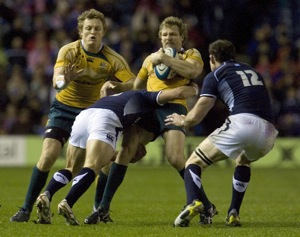
Australia's Peter Hynes, center, is tackled by Scotland's Alex Grove during the International Rugby Union match between Scotland and Australia at Murrayfield Stadium, Edinburgh, Scotland. Saturday, Nov. 21, 2009. (AP Photo/Chris Clark)
Usually I hate the cliche that ‘the team that wants it most will win.’ But, unfortunately, this is the summary that best makes sense of Scotland’s 9 – 8 victory over Australia at Murrayfield.
The Wallabies played complacently, as if they expected that sooner or later the dominant field position and their better skills would be rewarded with an inevitable victory.
Matt Giteau missed kicking 11 points (two relatively easy penalties, a field goal and a conversion). So hesitant, in fact, was Giteau with his kicking in the end that he nearly had his conversion charged down, even though he took it back to the 22m line.
Three tries were bombed by the Wallabies.
A halfback managed to turn Stephen Moore as he turned on his back over Scotland’s try line after being put into a big hole by a lovely delayed pass from Giteau.
Rocky Elsom tried to score from close range by turning on his back. He, too, was smothered with defenders. Quade Cooper tried a fancy, long pass, which spiralled well forward, when a shorter pass to the unmarked Ryan Cross would have done the trick.
What is it with this business of attacking the try line by diving backwards? As a coach of a C-grade school team in New Zealand many, many years ago I used to finish off every practice with the players running to the try line and diving across it to plant the ball. The point is that the technique of scoring a try has to be taught like the all the other skills.
I’d like to see this drill used for the Wallabies. They didn’t seem to have a clue how to get across the line until the end of the Test when after bash-up after bash-up by the Wallaby forwards under Scotland’s posts had failed, the ball was finally moved wider and Giteau put Cross into a gap to score an easy try.
Earlier this year there was some controversy regarding comments by John O’Neill, the CEO of the ARU, that the Wallabies should be paid on results.
At present they get, I believe, $11,000 a Test, win or lose. O’Neill suggested a higher amount for a win and a lower amount for a loss. RUPA, the players’ trade union, complained that the successful Wallabies in the past didn’t need financial incentives and that, anyway, players don’t play for the money.
Well, let’s see. Any number of people have ear-bashed me about how passionless the current Wallabies are in their play. This attitude, I believe, goes back to George Gregan who when accused of being passionless made the case that professional players didn’t have to get worked up or fired up to honour the jersey and perform well.
Tell that to Simon Poidevin or to Stephen Larkham, so sadly missed by this current Wallaby side and in the quarter-final of the 2007 Rugby World Cup at Marseille.
These players, and all the great players of the past, including the wonderful 1984 Grand Slam Wallabies, were never complacent about playing in the Wallaby colours. If blood had to be shed for the cause, it was and that was that.
But on Saturday the Wallabies betrayed this great tradition. There was no fire in the belly, even from someone like Elsom who used to play with the abrasiveness of a fireball.
As I watched the Wallabies complacently going about their business at Murrayfield I kept on thinking of them as the rugby-playing equivalents of those businessmen who continued to give themselves bonuses even though their companies were collapsing around them
Scotland played well, for a team that doesn’t have any standout players.
Ironically, the man of the match for some newspapers was Nathan Hines, who learnt his rugby in the Australian bush. Scotland defended tenaciously even when they were being totally out-played around the field for most of the Test. They played the occasional ball they won through the hands to force crucial penalties from a stretched Wallaby defence. And they kicked the crucial goals, from the penalty spot and from the field, something that Giteau couldn’t do on the day.
Here’s another cliche that generally is hard to cope with but which is true for the complacent Wallabies right now. The team is a ‘work in progress,’ we are told. Well judging from the emails I am getting from irate Wallaby supporters there is not much progress and not much work – on the field, at least.
The great thing about touring is that while the tour is on there is always the chance of redemption. That chance is next week against Wales at the Millennium Stadium. We want a Wallaby side that plays with typical Australian pride and tenacity, a side prepared to do the tough things well to get a victory.
A victory against Wales will create some momentum going into 2010. A defeat creates what was unthinkable a week or so ago – one victory out of four against the Home Unions.
Dr Herbert Moran was the Wallabies first great captain. On the 1908 tour of Britain and Ireland, Moran created the tradition of the Wallaby captain leading from the front, and of a team style that should be, as he put it, ‘vigorous and a little dangerous.’
In the epic Test against Wales which the Wallabies lost but not without a titanic struggle, Moran created a call that should be revived to inspire the current Wallabies: ‘We wanted the ball very badly from the scrum in those last moments. Each time we settled down to push, I would utter one single word “Australia,” and each time those forwards responded magnificently.’
Let’s see the spirit of the 1908 Wallabies at Cardiff in action on Saturday night.





























































































